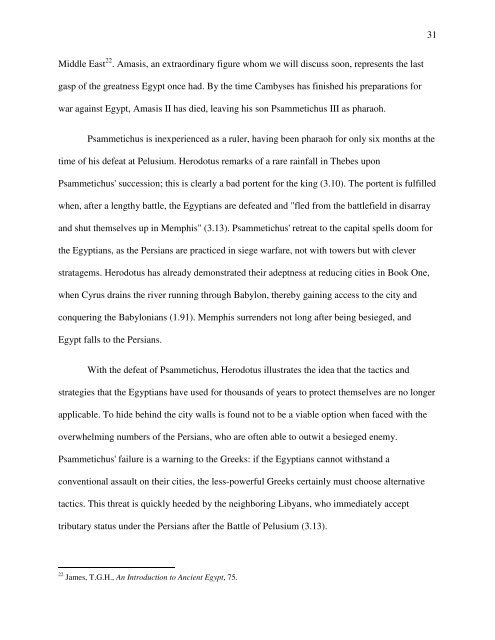The Old and the Restless - The Egyptians and the Scythians in Herodotus' Histories by Robert J. Hagan
You also want an ePaper? Increase the reach of your titles
YUMPU automatically turns print PDFs into web optimized ePapers that Google loves.
31<br />
Middle East 22 . Amasis, an extraord<strong>in</strong>ary figure whom we will discuss soon, represents <strong>the</strong> last<br />
gasp of <strong>the</strong> greatness Egypt once had. By <strong>the</strong> time Cam<strong>by</strong>ses has f<strong>in</strong>ished his preparations for<br />
war aga<strong>in</strong>st Egypt, Amasis II has died, leav<strong>in</strong>g his son Psammetichus III as pharaoh.<br />
Psammetichus is <strong>in</strong>experienced as a ruler, hav<strong>in</strong>g been pharaoh for only six months at <strong>the</strong><br />
time of his defeat at Pelusium. Herodotus remarks of a rare ra<strong>in</strong>fall <strong>in</strong> <strong>The</strong>bes upon<br />
Psammetichus' succession; this is clearly a bad portent for <strong>the</strong> k<strong>in</strong>g (3.10). <strong>The</strong> portent is fulfilled<br />
when, after a lengthy battle, <strong>the</strong> <strong>Egyptians</strong> are defeated <strong>and</strong> "fled from <strong>the</strong> battlefield <strong>in</strong> disarray<br />
<strong>and</strong> shut <strong>the</strong>mselves up <strong>in</strong> Memphis" (3.13). Psammetichus' retreat to <strong>the</strong> capital spells doom for<br />
<strong>the</strong> <strong>Egyptians</strong>, as <strong>the</strong> Persians are practiced <strong>in</strong> siege warfare, not with towers but with clever<br />
stratagems. Herodotus has already demonstrated <strong>the</strong>ir adeptness at reduc<strong>in</strong>g cities <strong>in</strong> Book One,<br />
when Cyrus dra<strong>in</strong>s <strong>the</strong> river runn<strong>in</strong>g through Ba<strong>by</strong>lon, <strong>the</strong>re<strong>by</strong> ga<strong>in</strong><strong>in</strong>g access to <strong>the</strong> city <strong>and</strong><br />
conquer<strong>in</strong>g <strong>the</strong> Ba<strong>by</strong>lonians (1.91). Memphis surrenders not long after be<strong>in</strong>g besieged, <strong>and</strong><br />
Egypt falls to <strong>the</strong> Persians.<br />
With <strong>the</strong> defeat of Psammetichus, Herodotus illustrates <strong>the</strong> idea that <strong>the</strong> tactics <strong>and</strong><br />
strategies that <strong>the</strong> <strong>Egyptians</strong> have used for thous<strong>and</strong>s of years to protect <strong>the</strong>mselves are no longer<br />
applicable. To hide beh<strong>in</strong>d <strong>the</strong> city walls is found not to be a viable option when faced with <strong>the</strong><br />
overwhelm<strong>in</strong>g numbers of <strong>the</strong> Persians, who are often able to outwit a besieged enemy.<br />
Psammetichus' failure is a warn<strong>in</strong>g to <strong>the</strong> Greeks: if <strong>the</strong> <strong>Egyptians</strong> cannot withst<strong>and</strong> a<br />
conventional assault on <strong>the</strong>ir cities, <strong>the</strong> less-powerful Greeks certa<strong>in</strong>ly must choose alternative<br />
tactics. This threat is quickly heeded <strong>by</strong> <strong>the</strong> neighbor<strong>in</strong>g Li<strong>by</strong>ans, who immediately accept<br />
tributary status under <strong>the</strong> Persians after <strong>the</strong> Battle of Pelusium (3.13).<br />
22 James, T.G.H., An Introduction to Ancient Egypt, 75.
















